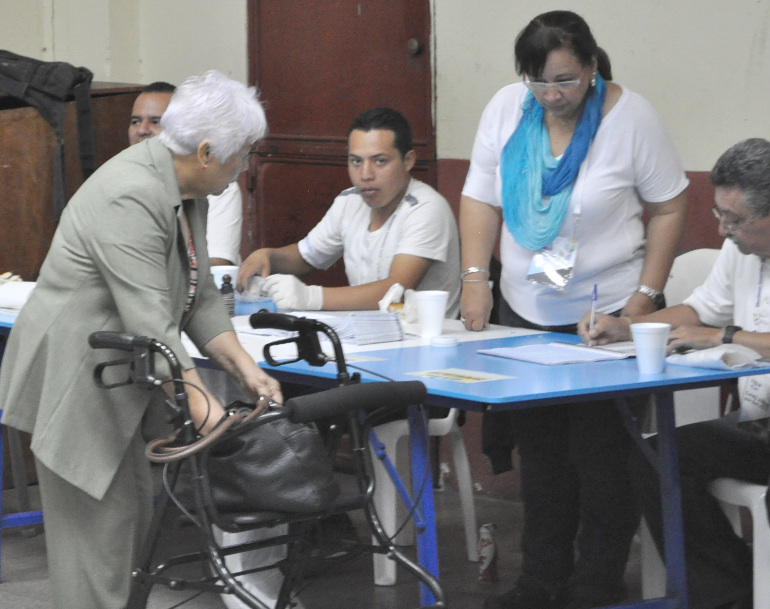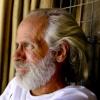
As he sat outside a polling station downtown Oct. 25 and waited to vote, Eduardo Torres considered that he had never participated in a presidential election quite like this one. He watched Guatemalans filing past vendors selling tortillas, candy and inflated balloons and marveled at his choices; a comedian, Jimmy Morales, or a former first lady, Sandra Torres.
Torres, a motorcycle salesman and no relation to Sandra Torres, could not contain his surprise that Morales, a TV entertainer with no political experience, was leading in the polls. Hours later, when Morales was declared the winner with 67 percent of the vote, Torres, 60, just shrugged.
“I’m impressed,” he said. “Jimmy has a lot of credibility, I suppose. He doesn’t have a political background. Still, it is surprising how he shot up. Now, we just must pray for him.”
The Morales victory followed citizen outrage over a corruption scandal that bilked the impoverished nation of nearly 16.3 million people of millions of dollars and inspired thousands of middle-class Guatemalans, considered to be mostly apolitical, to take to the streets and demand change.
It remains to be seen whether Morales, who on his TV show has portrayed a peasant who accidentally became president, can deliver on his promise that he will be neither corrupt nor a thief. His landslide victory followed the arrest of Guatemala’s president, vice president and central bank chief for their alleged involvement in bribery and tax corruption schemes and the public fury that followed. But some political observers say that while the face of the presidency may have changed, the political system of endemic corruption has not.
“This lollipop version, a public uprising to remove the president, appeals to us. Guatemala is an example for the world of democracy,” said Mario Roberto Morales, a sociology professor at the University of San Carlos in Guatemala City. “Long live interconnected youth on social media for organizing and protesting. That is the politically correct version of what happened. But indignation is an emotion and if it isn’t developed into a movement with an agenda, it fades away. We need to connect people in street with existing grass roots movements -- workers parties, indigenous parties, a united front for all of civil society. If we don’t, I don’t think the movement will survive.”
Despite the appeal of his outsider status, Morales’ election was supported by old school political players, including the membership of his National Convergence Front*. The party was founded in 2004 by retired generals determined to protect the interests of the military following the 1996 peace accords that ended a 36-year-long civil war. Some in the party have been accused of being involved in the deaths of an estimated 140,000 to 200,000 people, including civilian and indigenous communities, who were killed or disappeared.
Rooting out corruption, if he chooses to, and showing he does not answer to any particular interest group on the right or the left may well determine the success of the Morales presidency. If he is deemed as being no different from the corrupt political leaders who preceded him, his administration may face the kind of public unrest that propelled him into power. Should he confront corruption as he has promised, Guatemala’s power brokers, especially the military and some economic interests, might take steps to maintain their authority and political stability.
“Jimmy Morales is starting his government with a lot of support,” said Alvaro Velasquez, 47, a newly elected congressman with the Convergence for Democratic Revolution*, a center left party. “He may get over confident because he has so much support. It is up to the protestors to remain vigilant and for Jimmy to maintain his political capital. He can save it or spend it quickly. It is up to him. He can be smart and form a cabinet of national unity or he can allow the military to regain its old positions of power and dig his own grave.”
Morales’ unlikely ascent to the presidency began when President Otto* Pérez Molina was arrested in September as a result of Guatemala’s Justice Department, in close collaboration with the United Nations International Commission against Impunity in Guatemala, investigating a corruption scandal known as La Linea, “The Line.” The scheme, according to the U.N. commission, involved Guatemalan customs agency providing importers with reduced tariffs in exchange for cash benefits that were shared among dozens of government officials.
Commission investigators released their initial finding in April, causing a public outcry. The investigators concluded that Molina had received as much as $3.7 million in bribes by importers in exchange for illegal discounts on their customs duty.
“We looked at importers,” said Julio Prato, 36, a district attorney and a member of the U.N. commission investigating team. “We tapped the phone line of a Chinese merchant the first week of the investigation and heard the voice of a Guatemalan customs agent discuss a criminal organization that was taking care of shipping containers. They would arrange a price and call a number to let them through. They called it ‘la linea’ or ‘la coli’ for collaboration.”
Prato said that in one wiretapped call this year, investigators listened to a conversation that implicated Molina and his vice president, Roxana Baldetti. The president was called “number one” and had left instructions about dispersing various payments.
Investigators monitored more than 60,000 calls from the alleged conspirators, Prato said, and nearly 6,000 emails and 175,000 documents. The United States assisted the investigation by providing the U.N. commission with $21 million to finance investigations into the use of drug money for Guatemala’s political parties.
“Everyone here knows that all corruption stems from the heads of government,” Prato said. “But we could not prove it until now. We didn’t expect the investigation to go this far up and then to have the protests. Up to this point, people didn’t care about corruption. However, this time was different. We could prove what had happened. People felt as if the government was mocking them. No one had presented a case against the president before.”
According to Prato, Morales has promised to support the U.N. commission as president. But that may be a promise, he said, Morales may not have the political support to keep it.
“Think of the money in his party,” Prato said. “We don’t know if it’s clean or dirty.”
The desire of the public for someone who was not a politician tainted by scandal or corruption to be elected president propelled him to his overwhelming victory, said Mauricio Chaulon Velez*, professor of history and anthropology in the school of political science at Rafael Landivar University, a Jesuit institution.
“The traditional groups of power took advantage of the protest groups’ need for a fresh face and gave them Jimmy, someone these groups can control,” Chaulon said. “Jimmy Morales is a fresh face. He’s like a normal citizen, a common man. During the campaign, he adopted visual symbols like rolling up his sleeves. He invoked God and Biblical references. He took very conservative stances on abortion and feminism that resonated with some elements of the public.”
Had the U.N. commission not been involved, Chaulon said, Molina never would have been arrested. However, he does not anticipate the corruption crackdown to continue in any significant way.
“The corruption was so over the top that no one could ignore it,” he said. “But the political system will impose limits on [the U.N. commission]. It will be a system of controlled corruption but not a system eliminating corruption.”
For some of the protestors, the ouster of Molina and the election of Morales felt like a mixed triumph.
“A lot has been achieved, all these people were arrested,” said lawyer Gustavo* Maldonado, 41, a participant in the protests. “On the other hand, I am not surprised by the election of Jimmy Morales. His ideology is that of the middle class. They see this guy who has never been in politics and think he is one of us. He takes people to a superficial vision of what government can be.”
But Congressman-elect Velasquez cautioned against dismissing Morales’ victory as a change of political players and nothing more.
“I would argue the goals of the protestors were achieved,” he said. “The president was arrested and the vice president and members of congress, too. There was the election of political parties like mine. We have all of these new faces. There is a sense that some doors have been opened to people outside even as some of the old political structures remain.”
For now, many of the people who voted for Morales have adopted a wait-and-see attitude for when he takes office in January.
“It is a good thing people have opened their eyes,” said Monica Perez, a dressmaker and a Morales supporter. “The country has been victimized by so much corruption. Candidates promise and then they take. It is sad and disappointing but now the people expect more. We now have the people’s choice. We don’t know how Jimmy will do. He hasn’t dealt with politics. He has no baggage. May he do the job properly in an enlightened way.”
*Editor's note: This story has been updated to correct various names and titles throughout.
[J. Malcolm Garcia is a freelance writer and author of The Khaarijee: A Chronicle of Friendship and War in Kabul and What Wars Leave Behind: The Faceless and the Forgotten. He is a recipient of the Studs Terkel Prize for writing about the working classes and the Sigma Delta Chi Award for excellence in journalism.]




